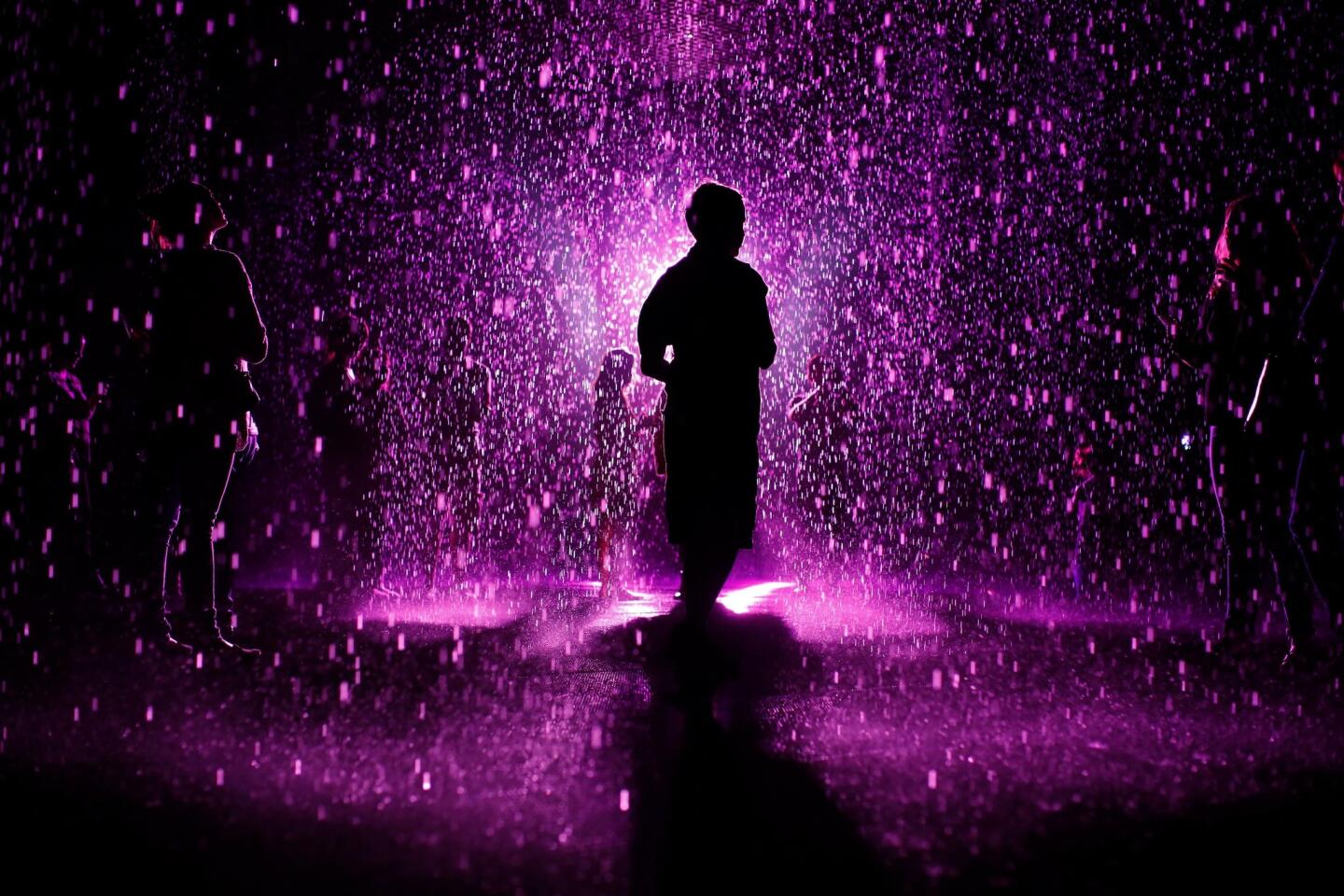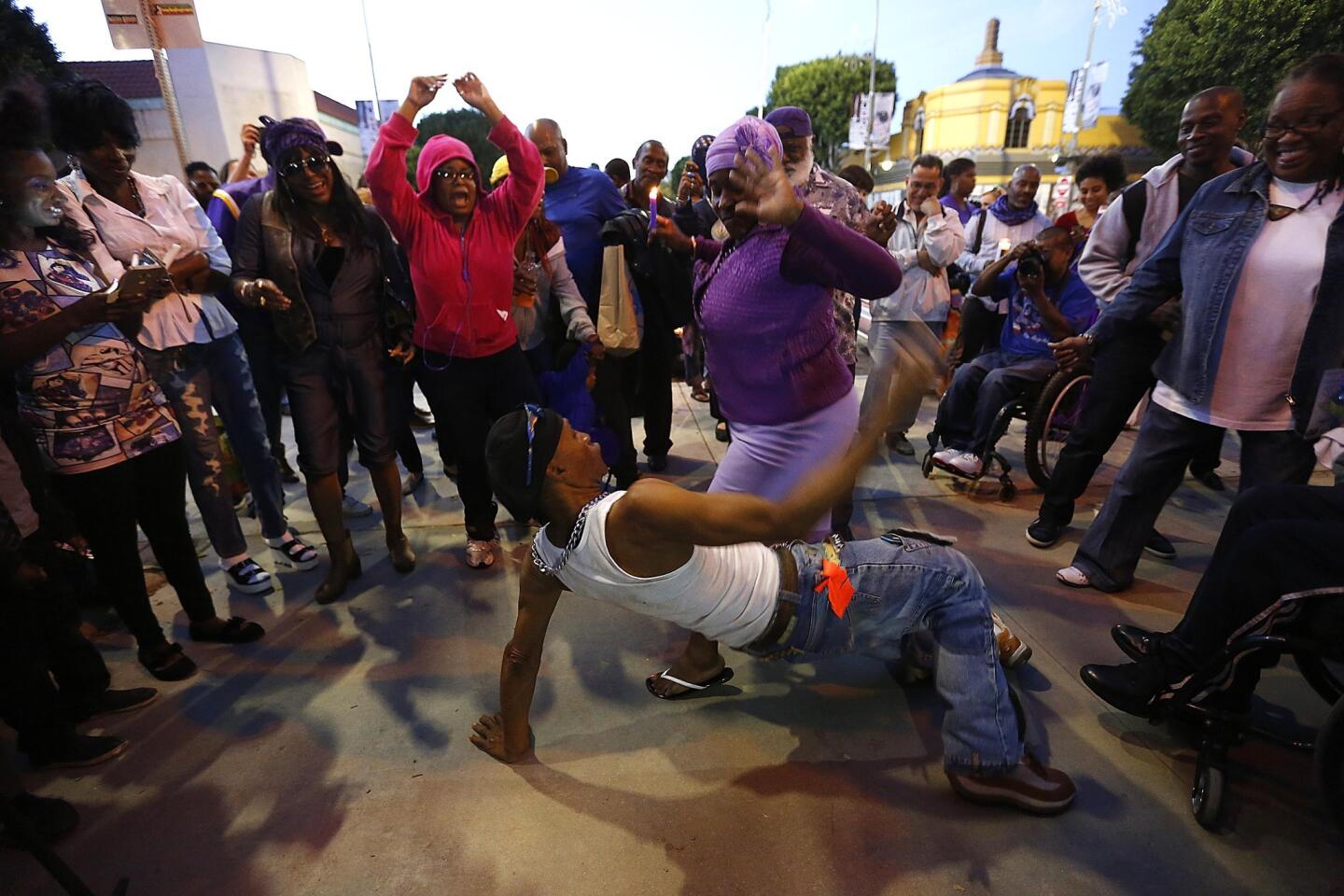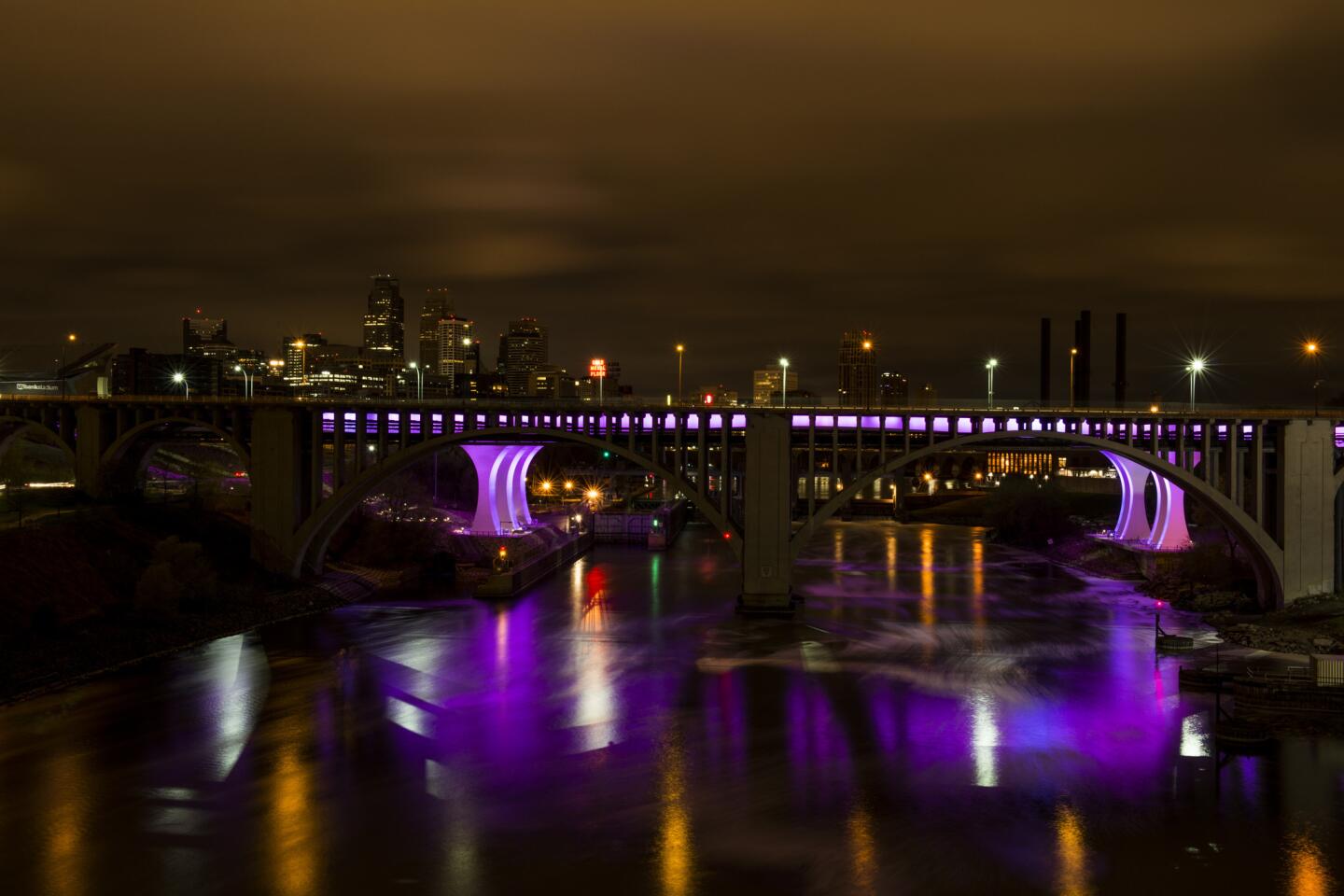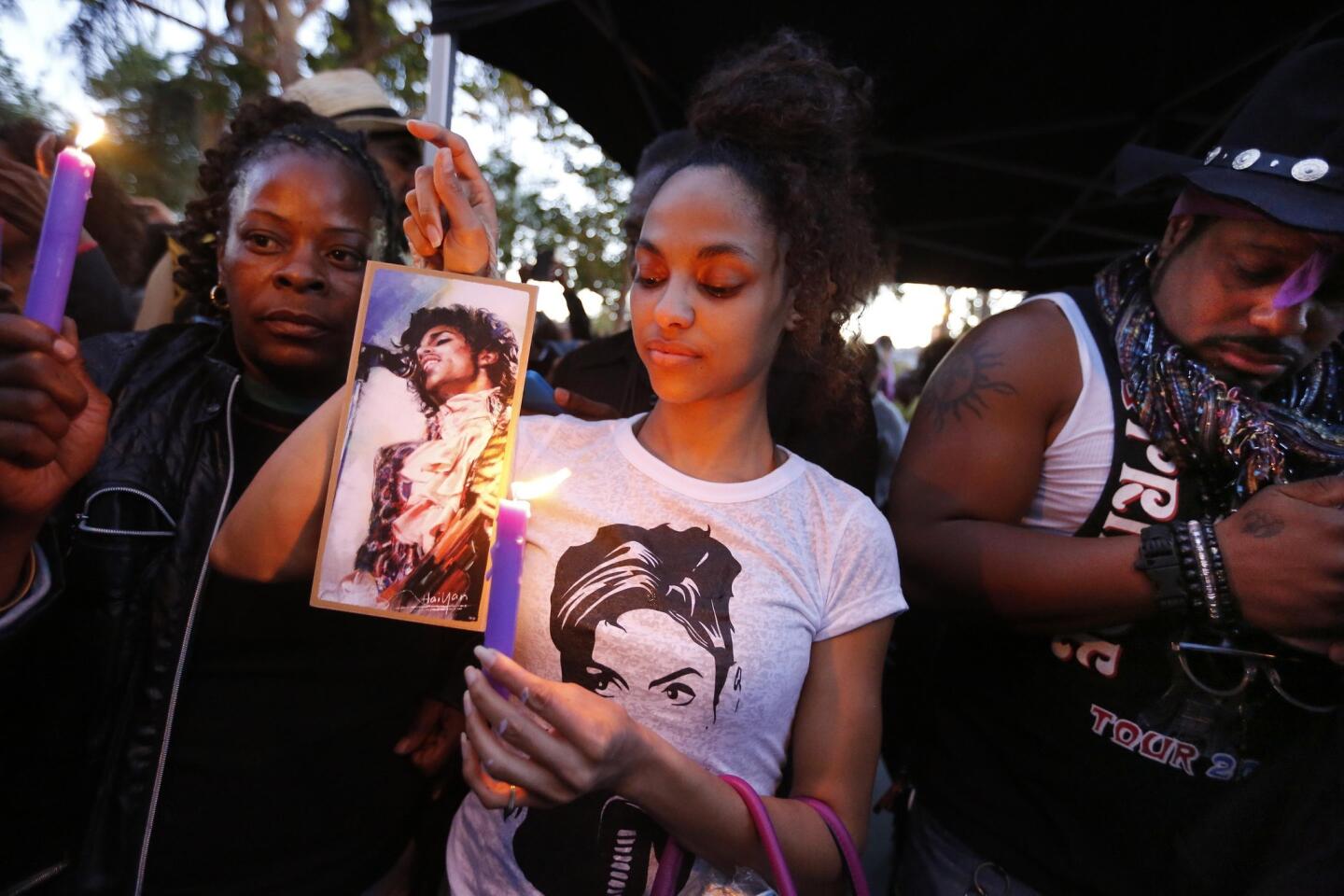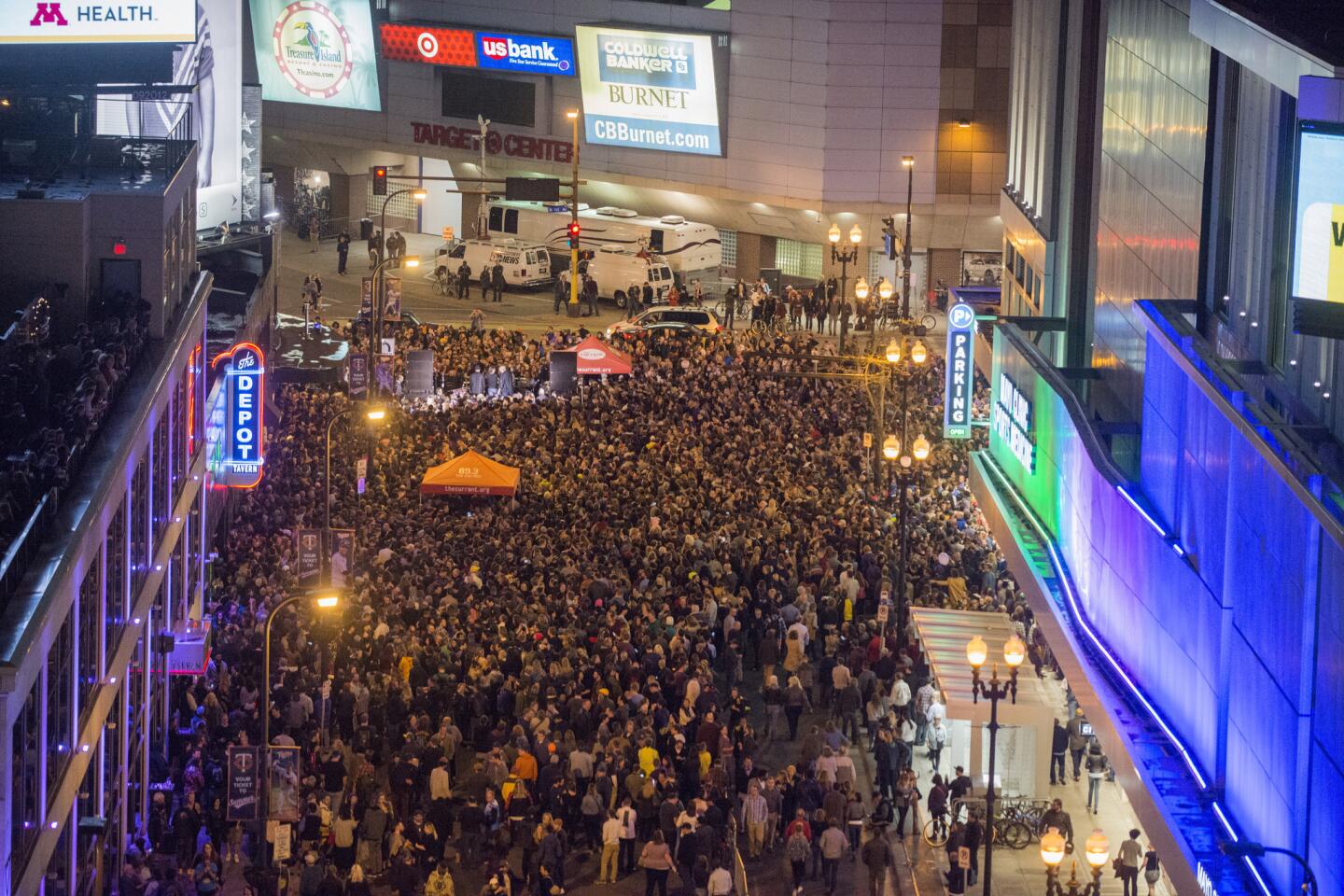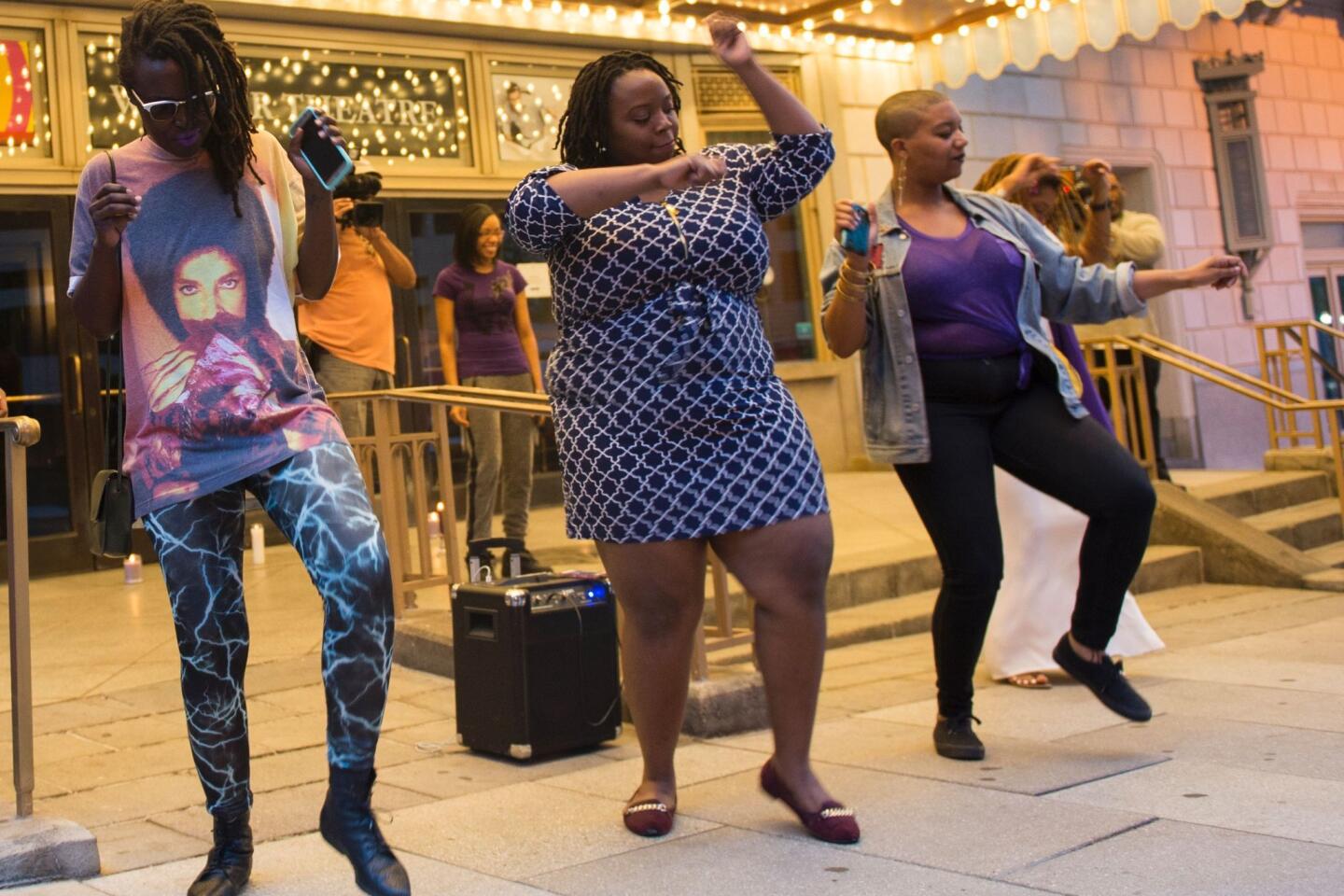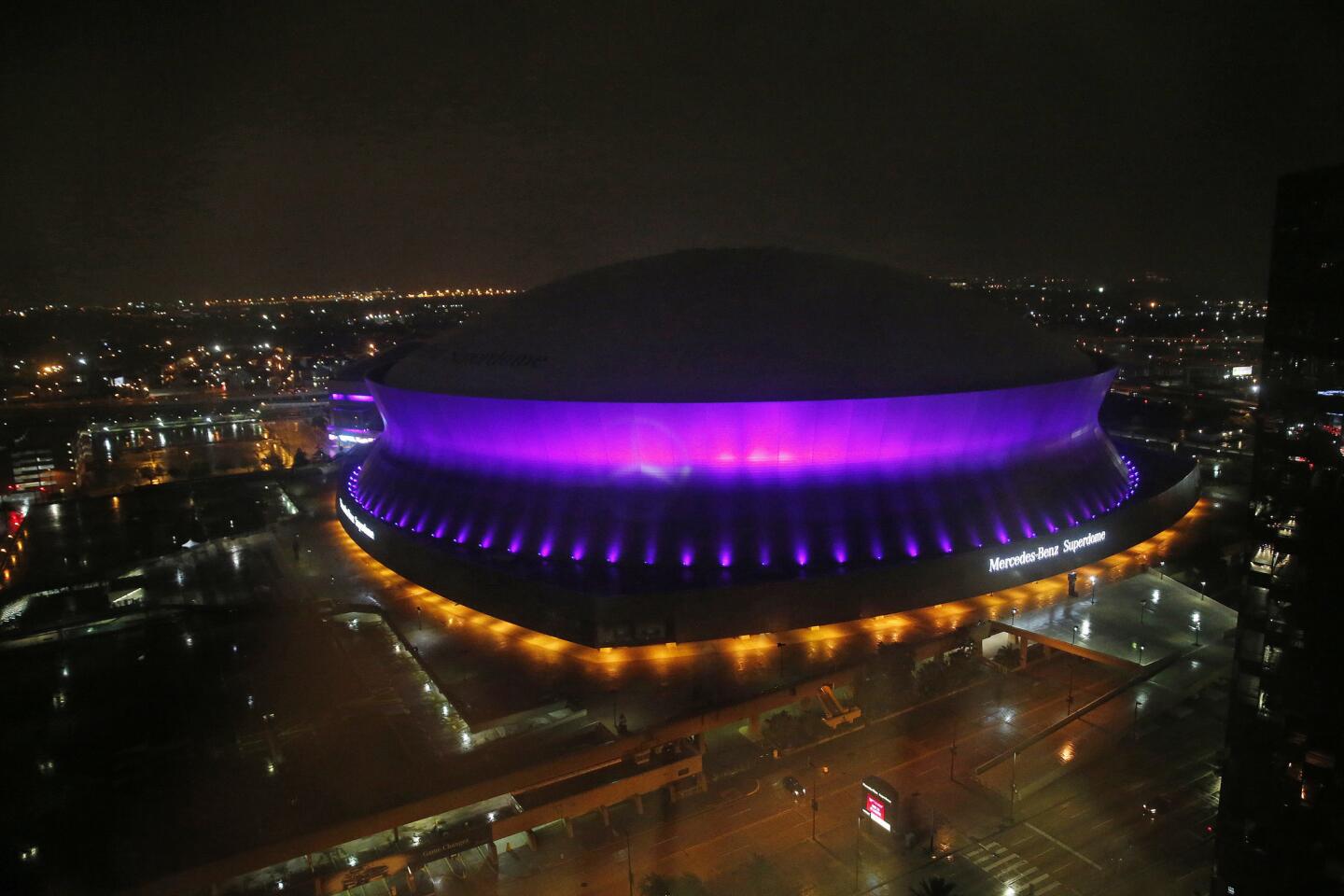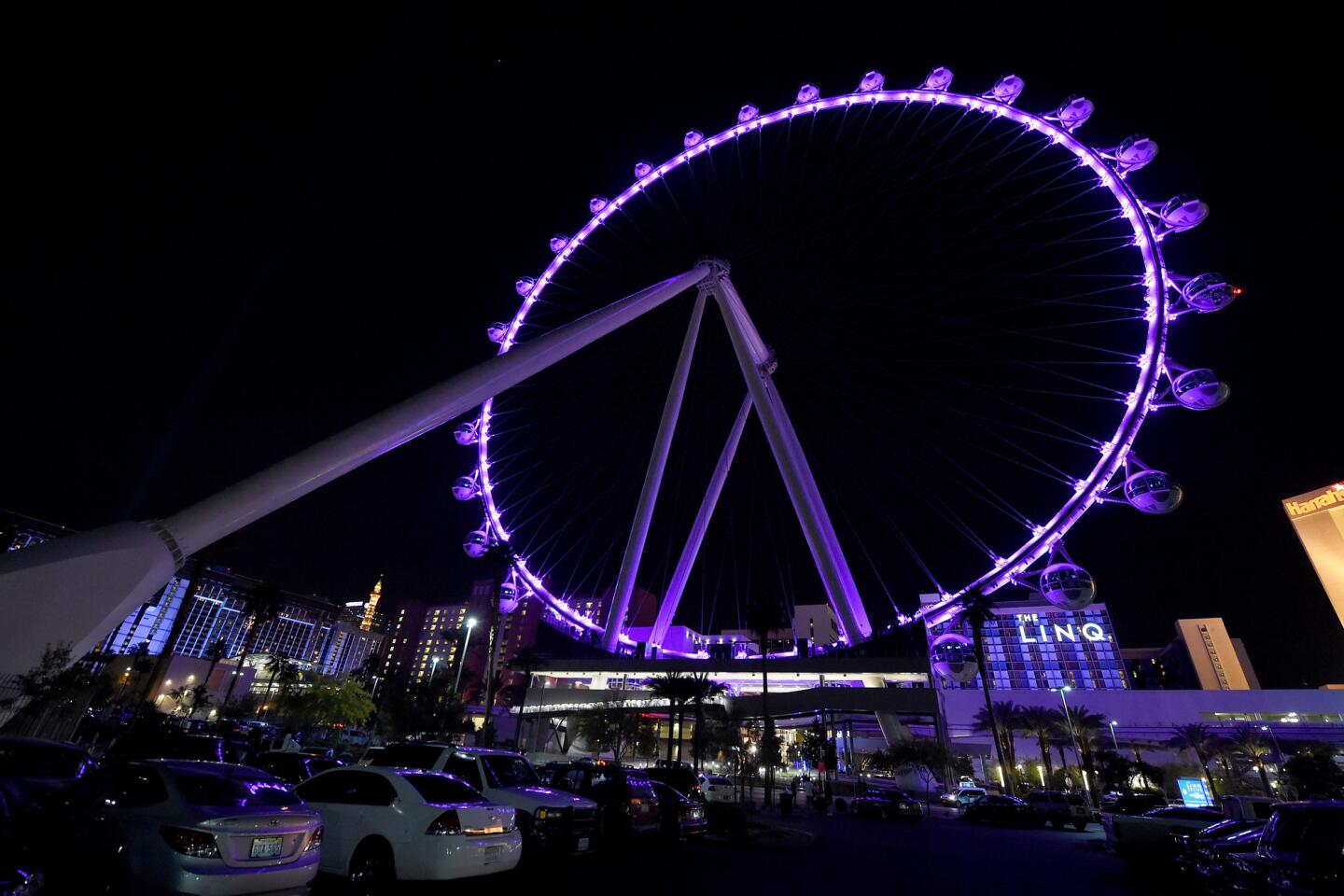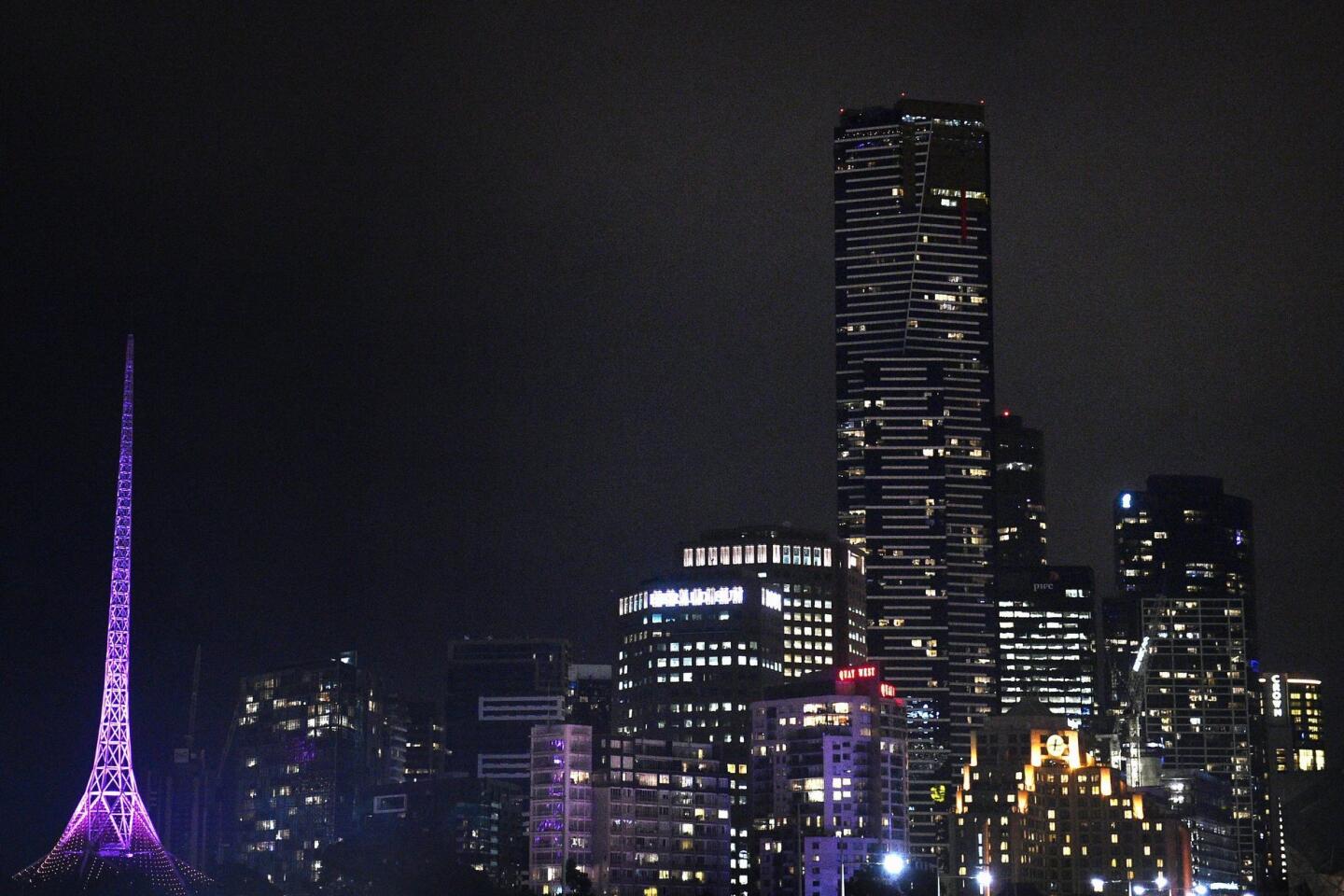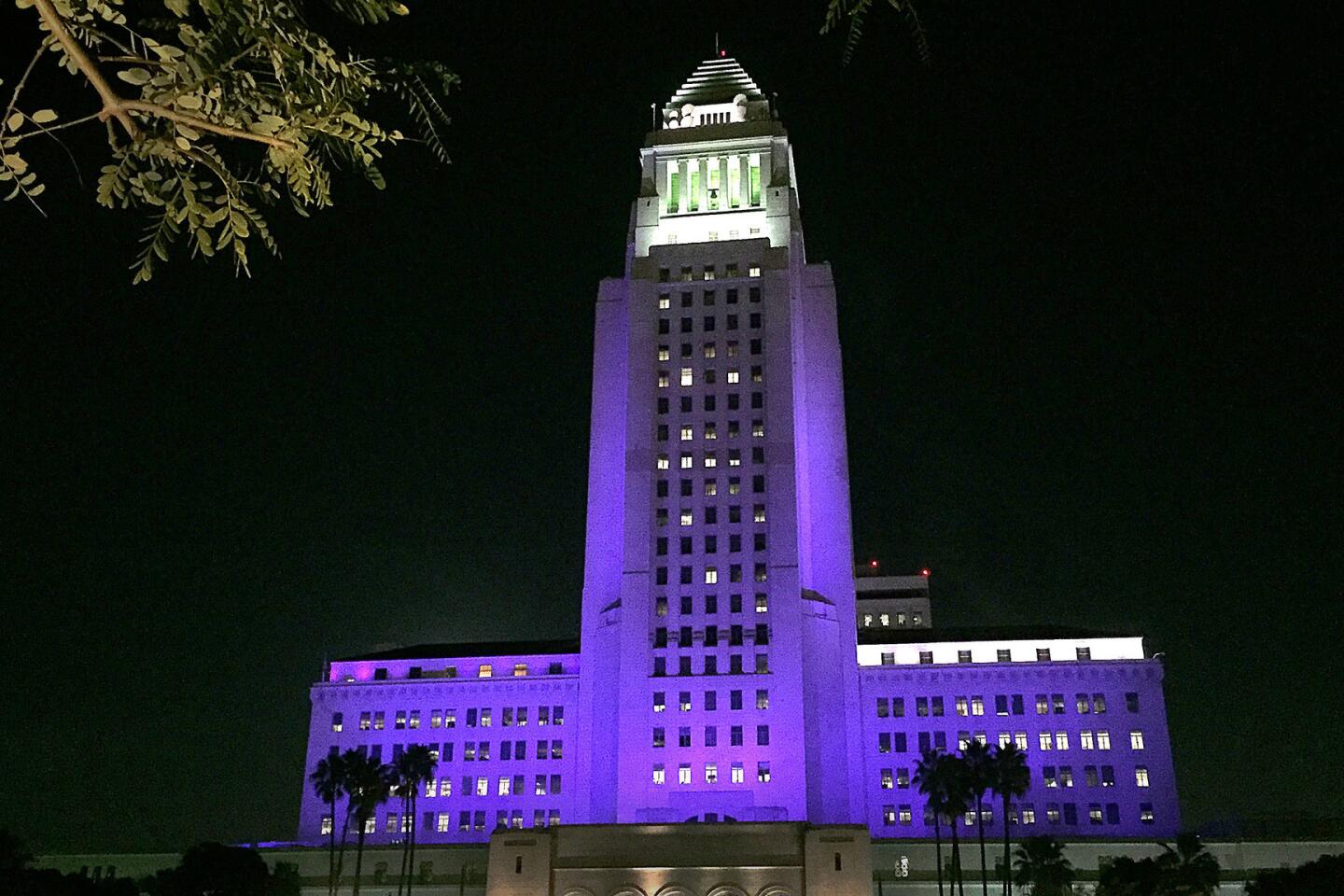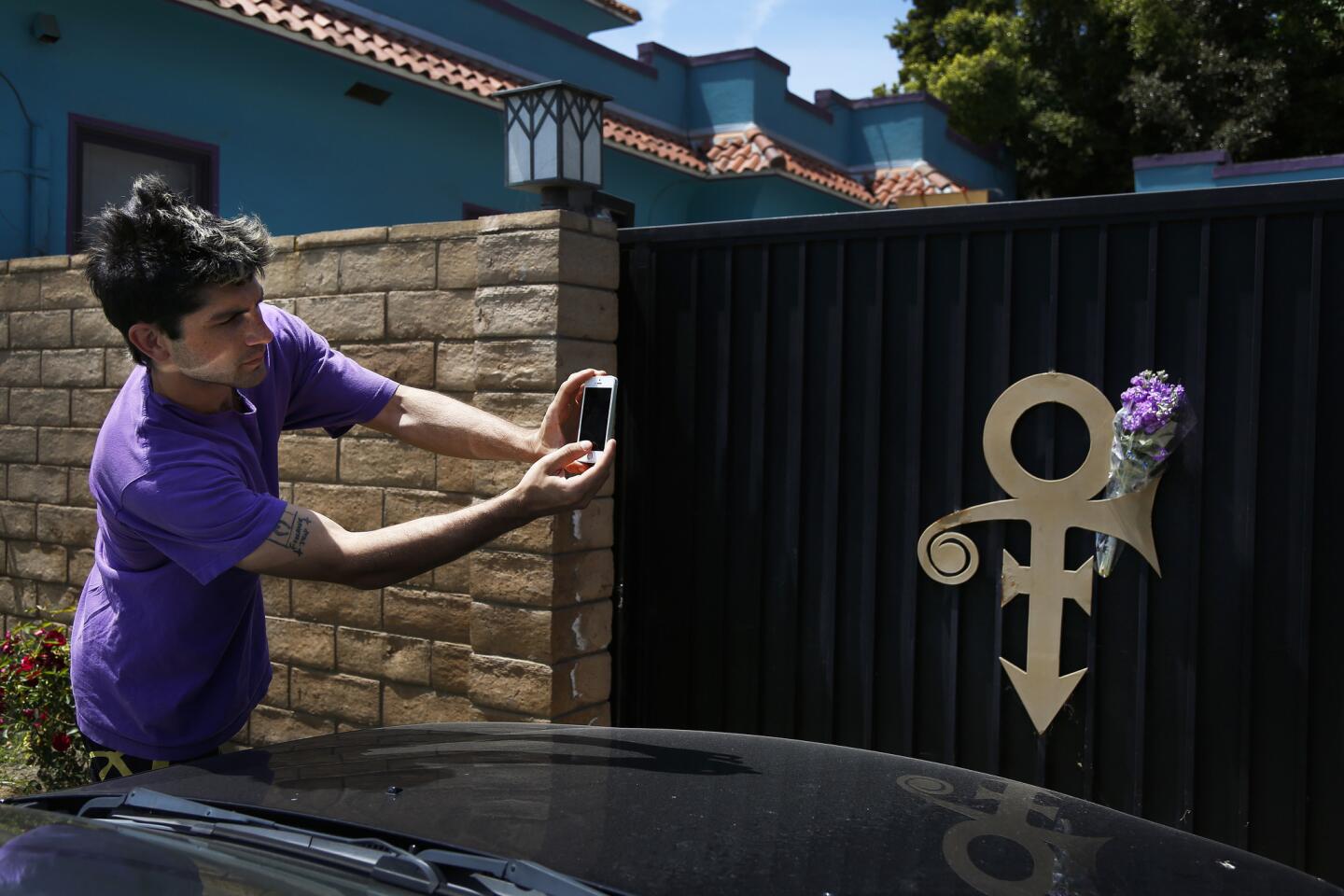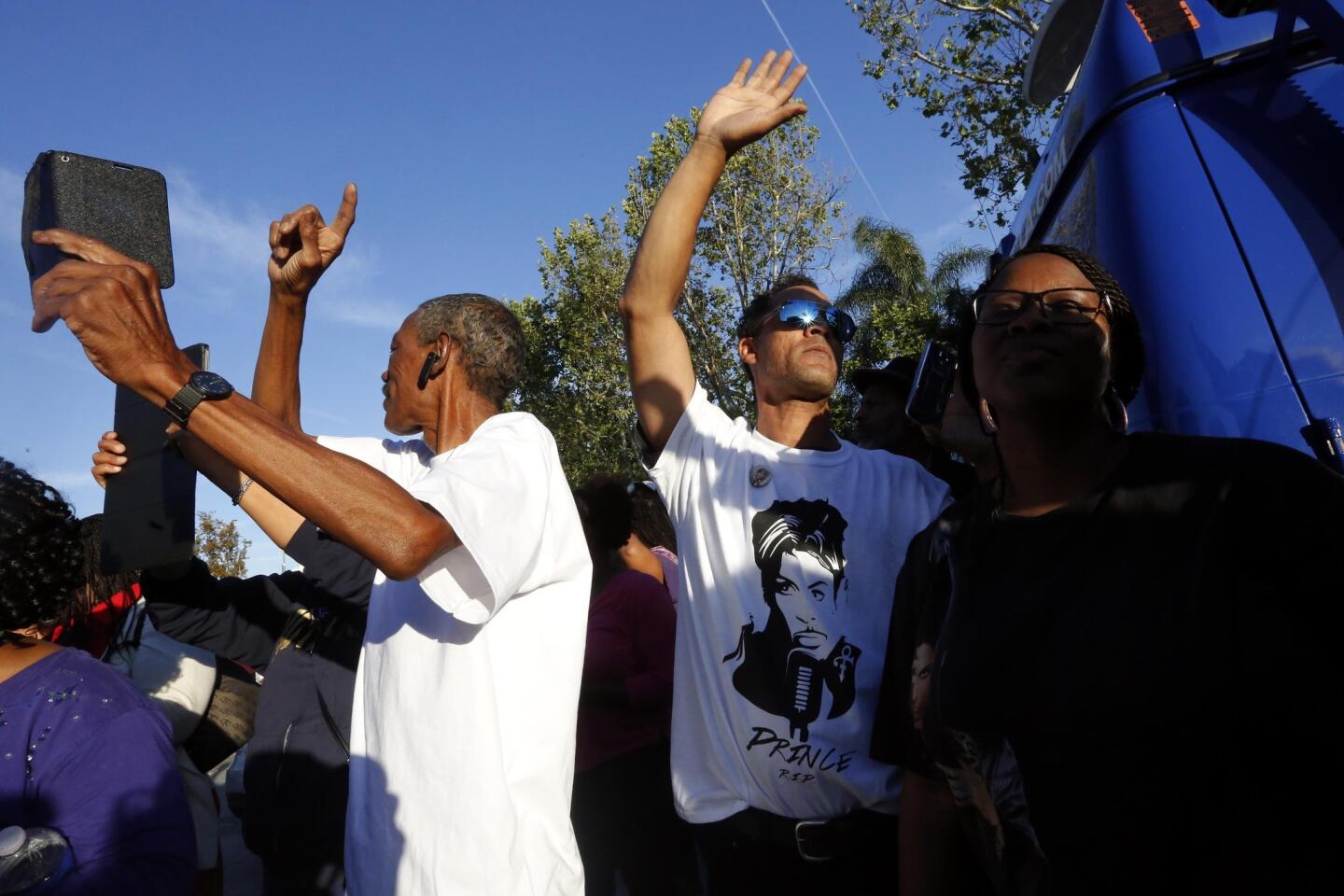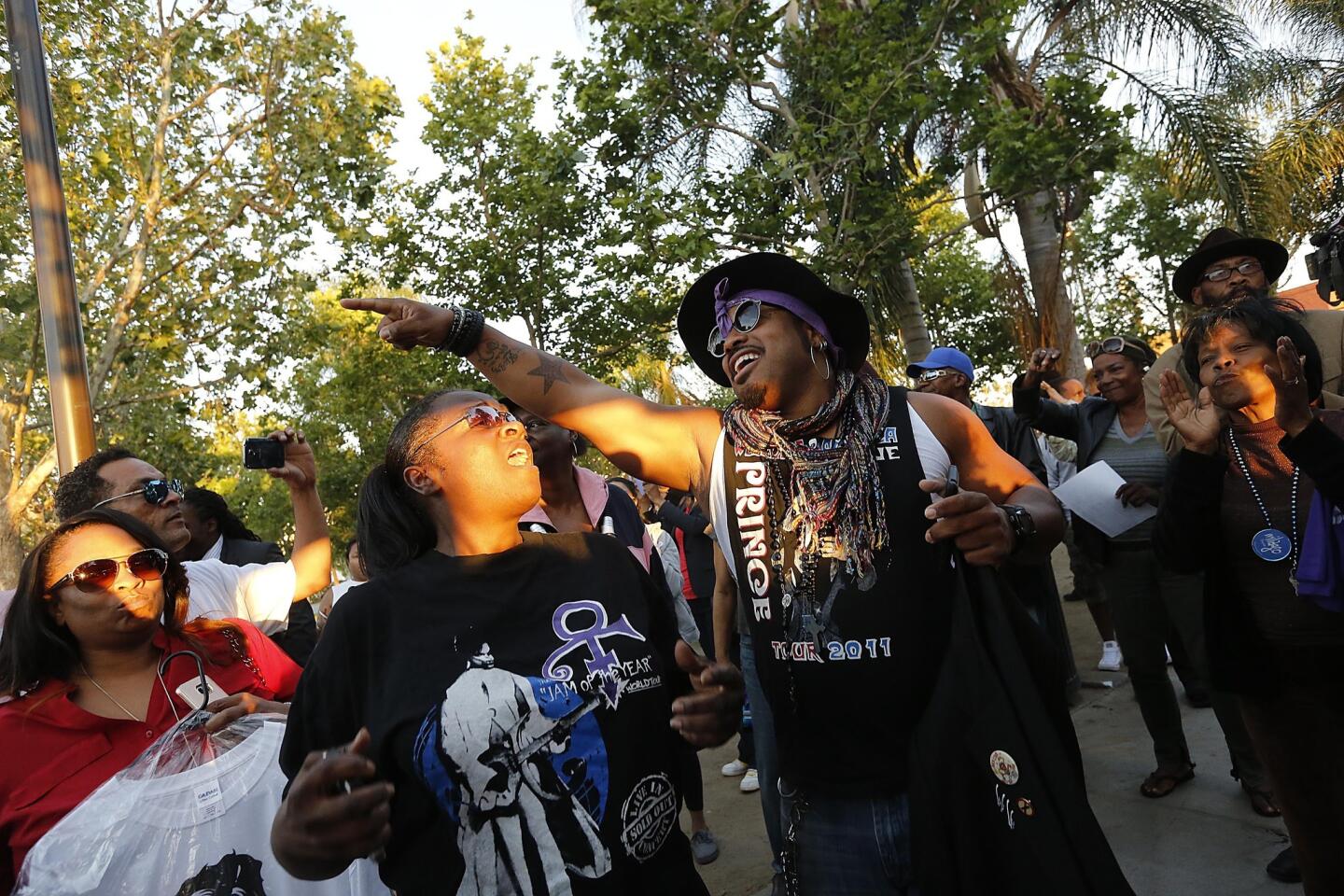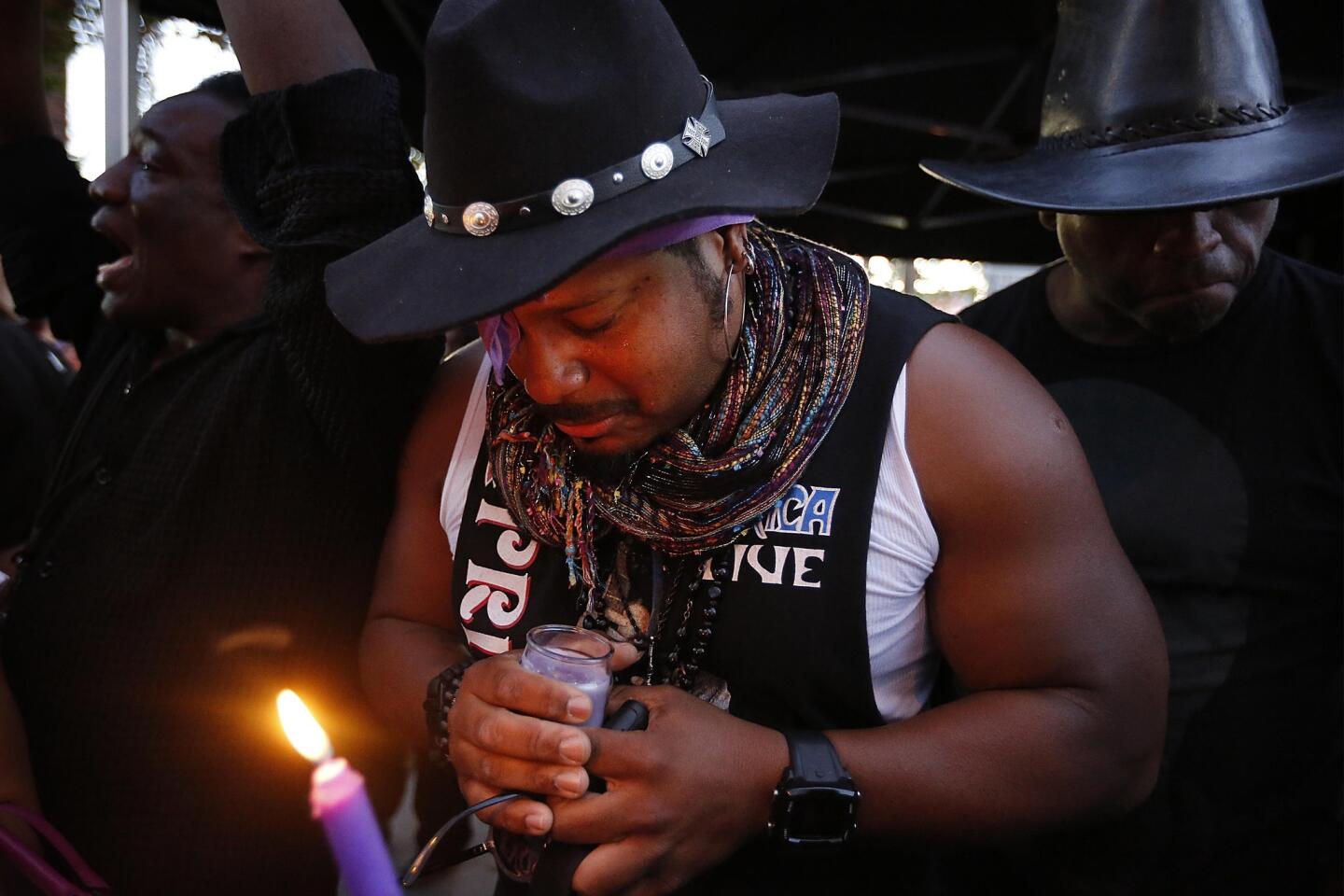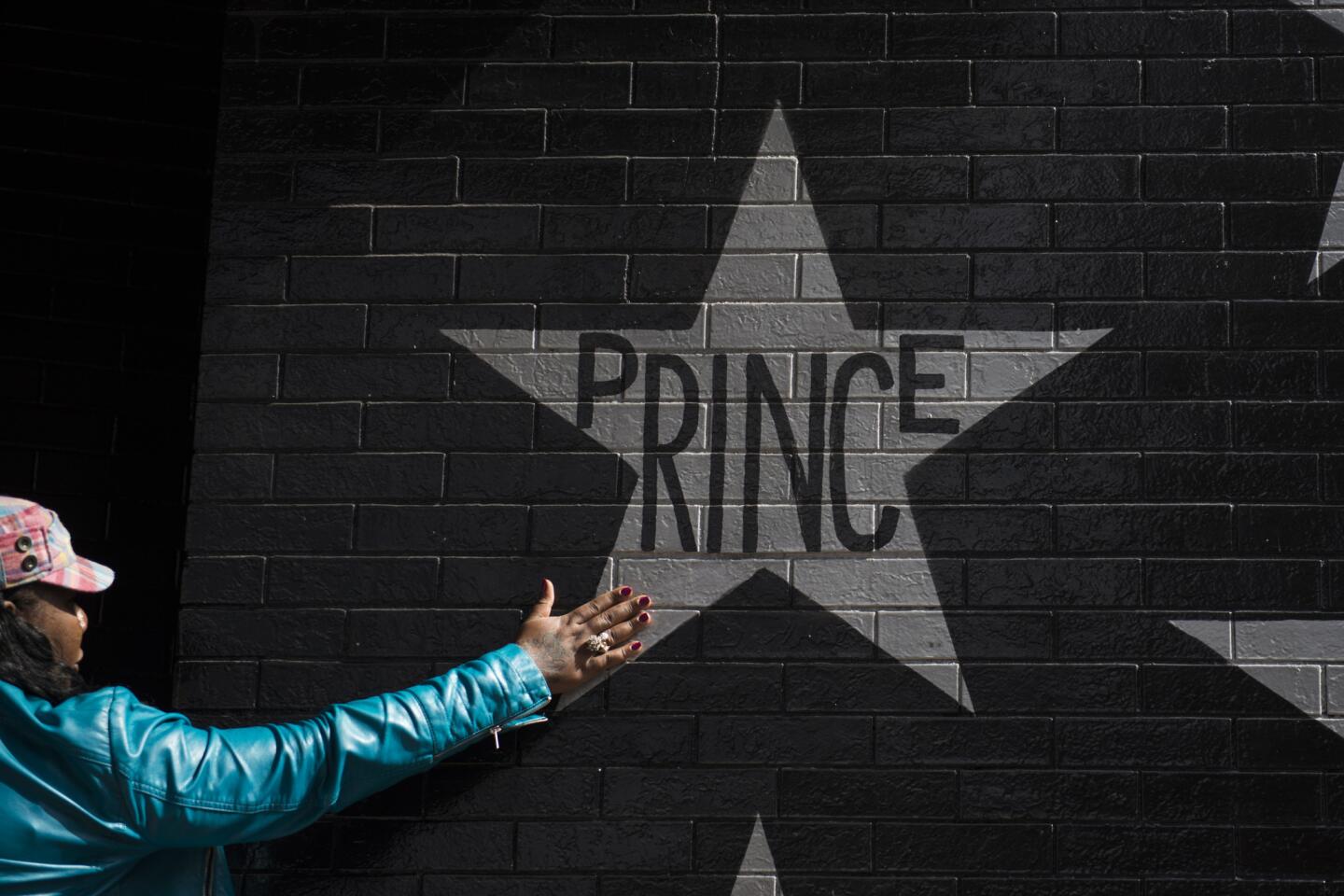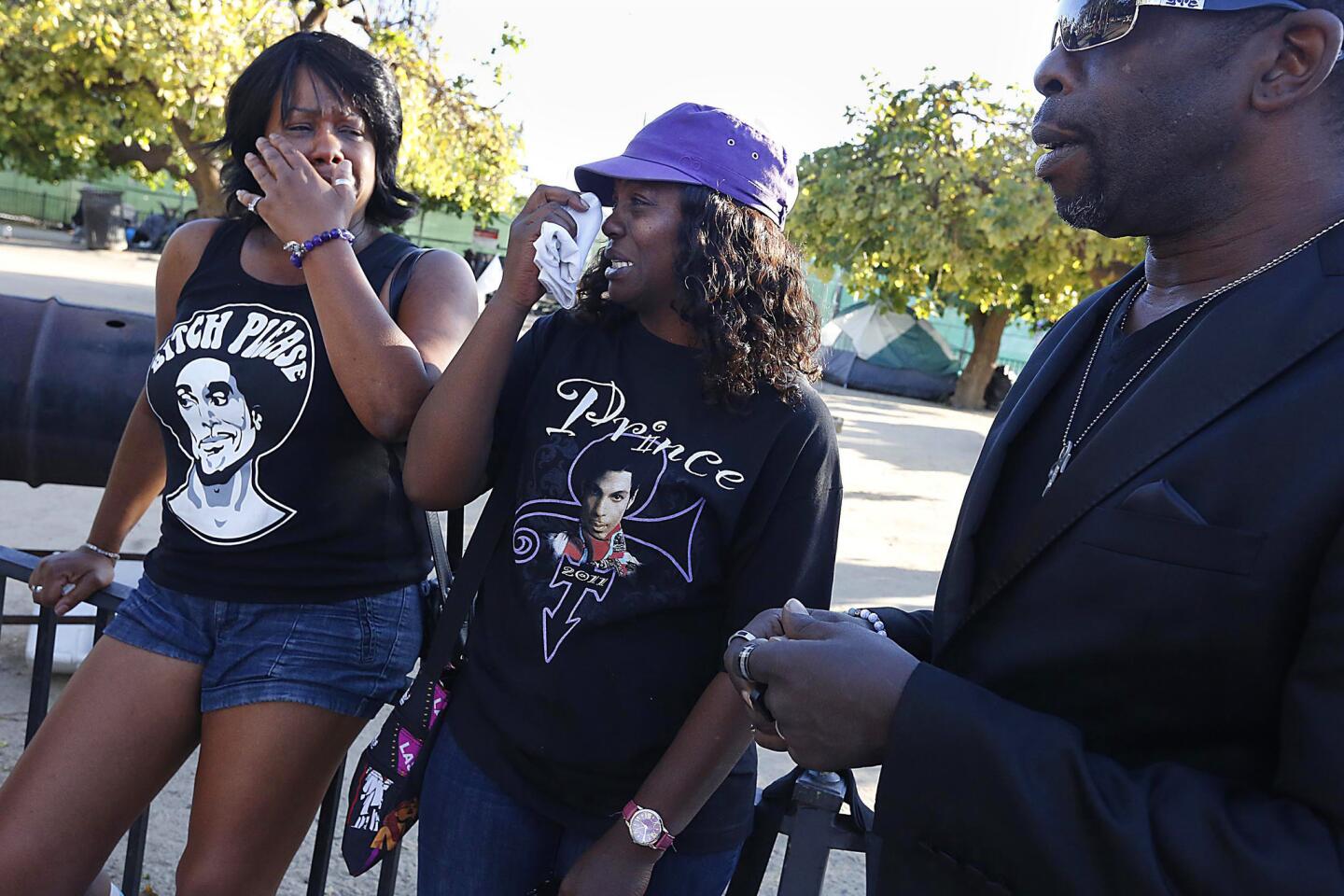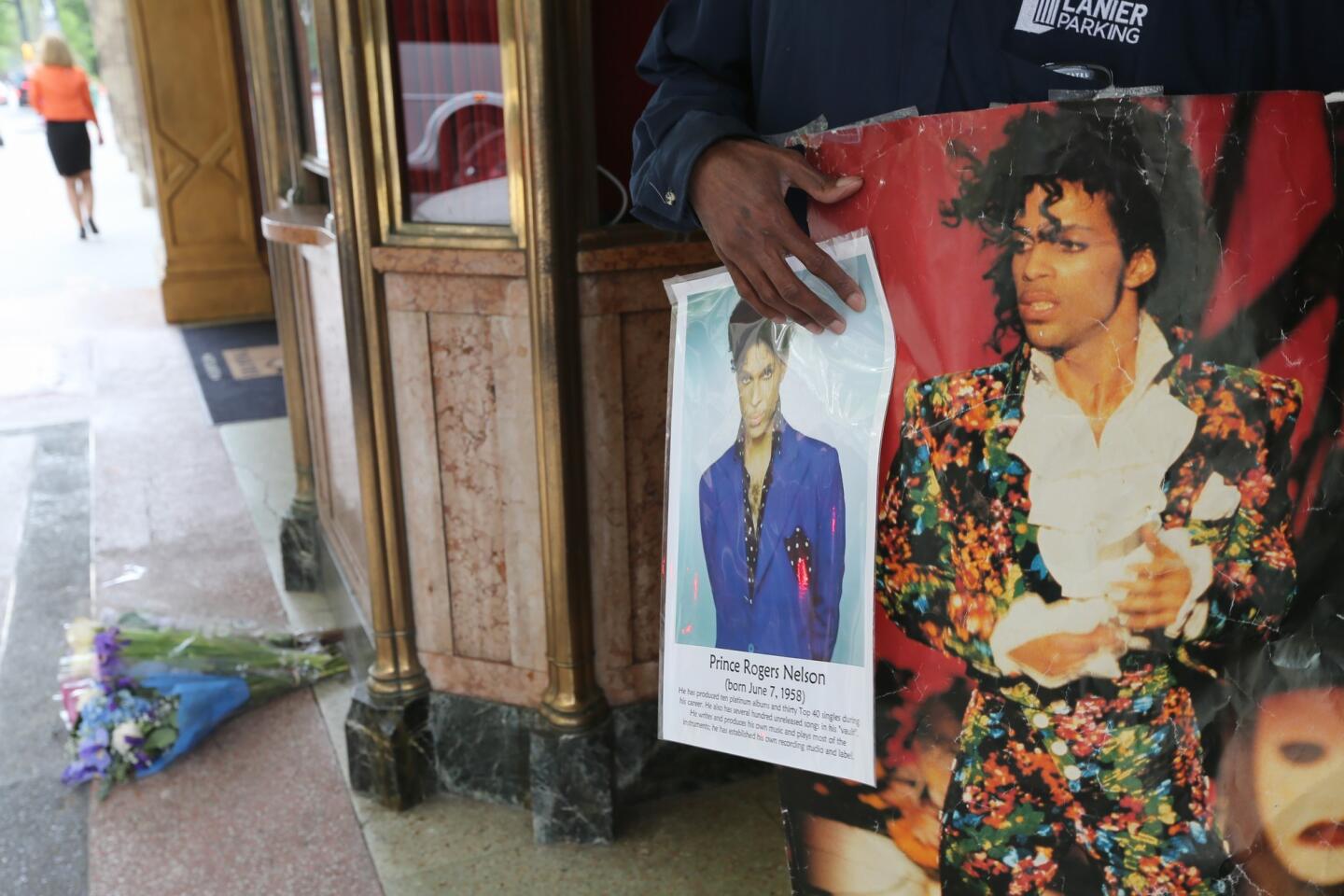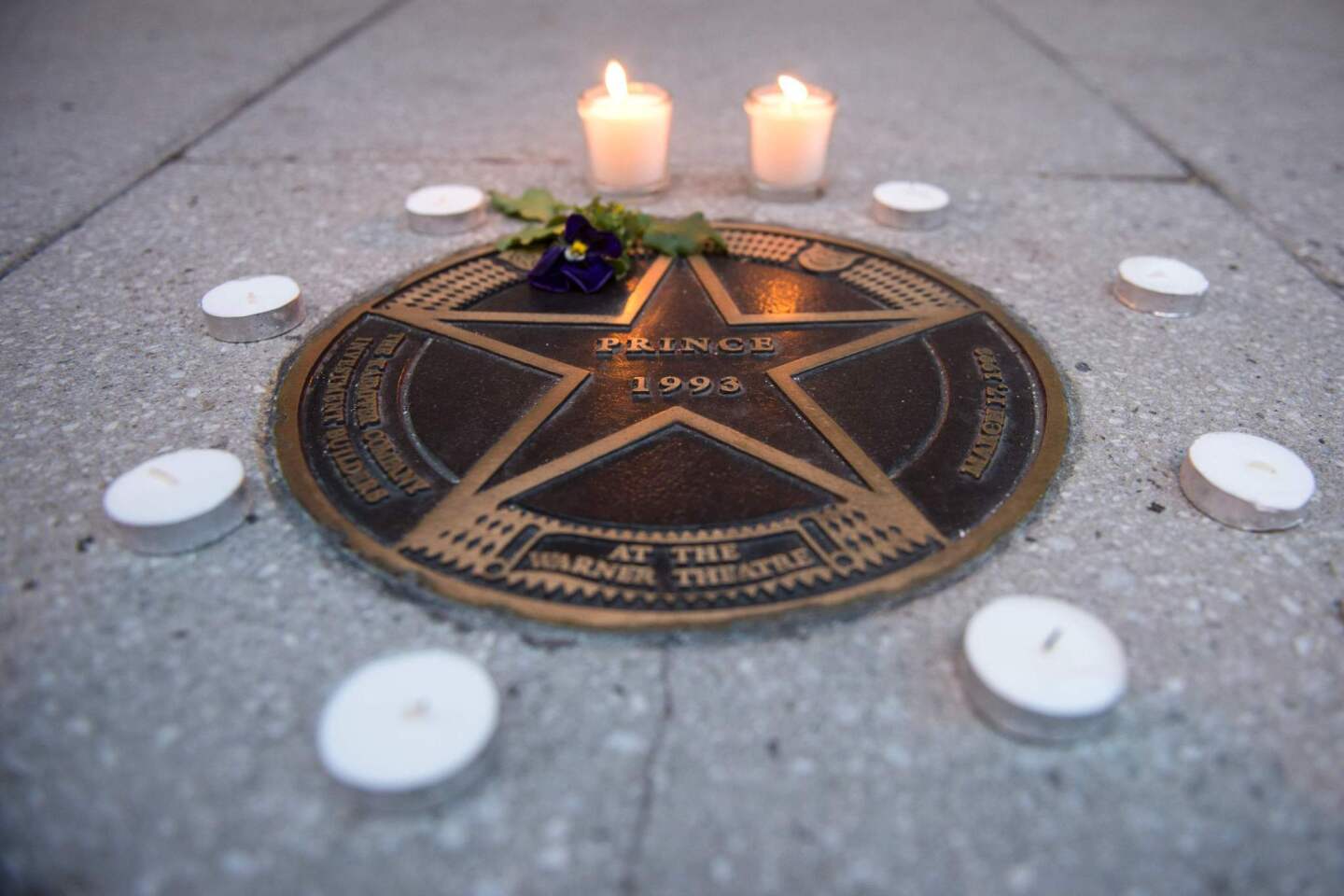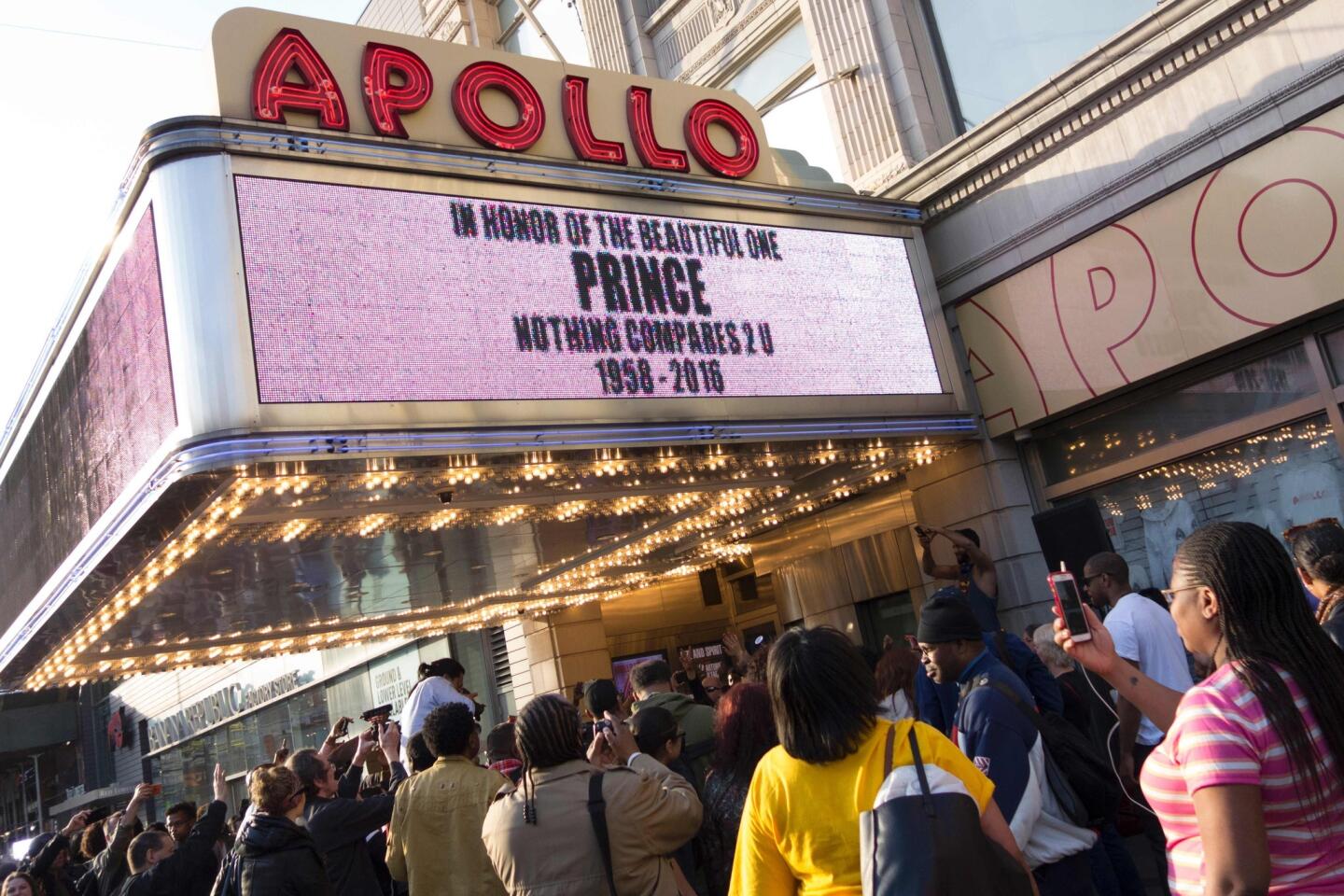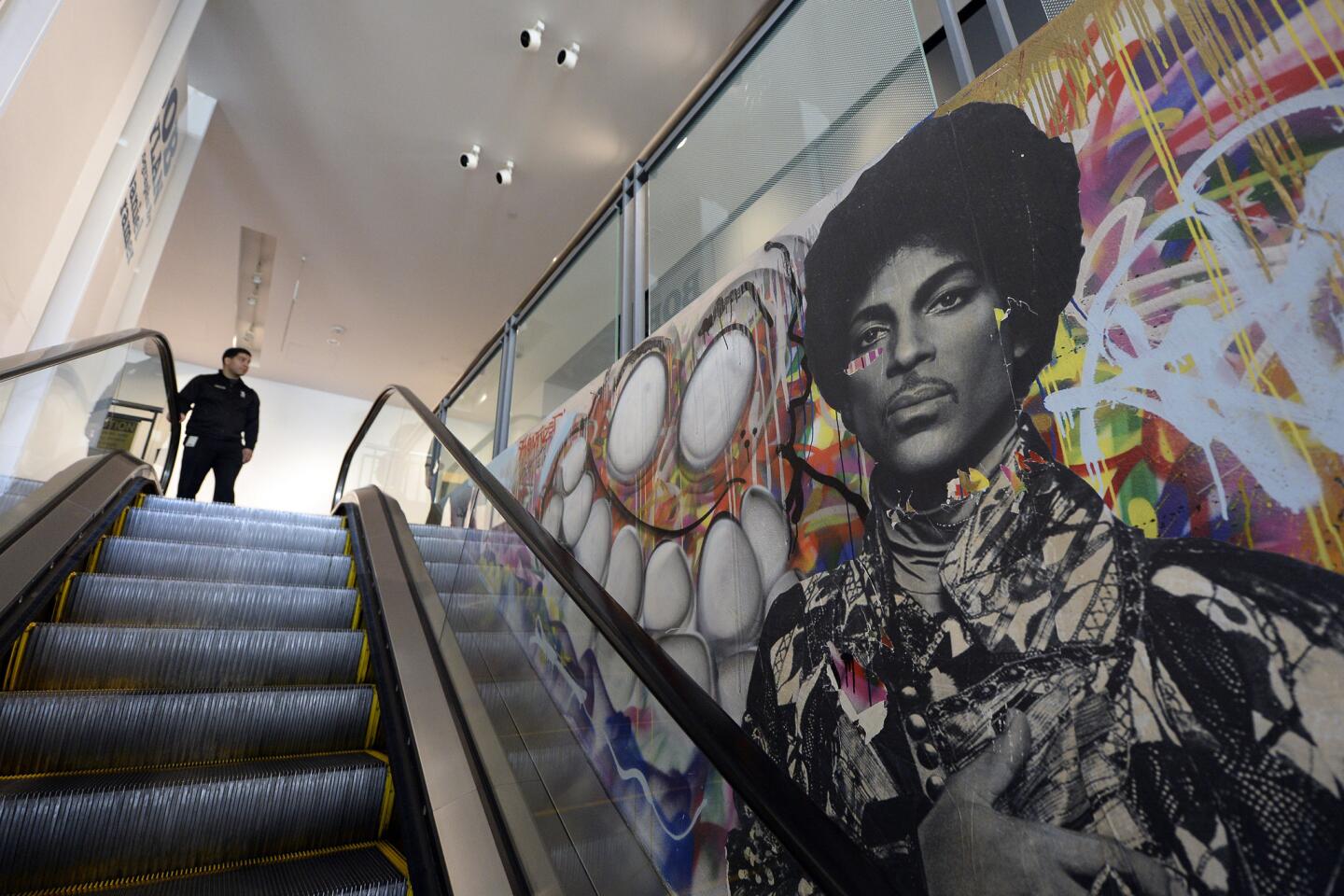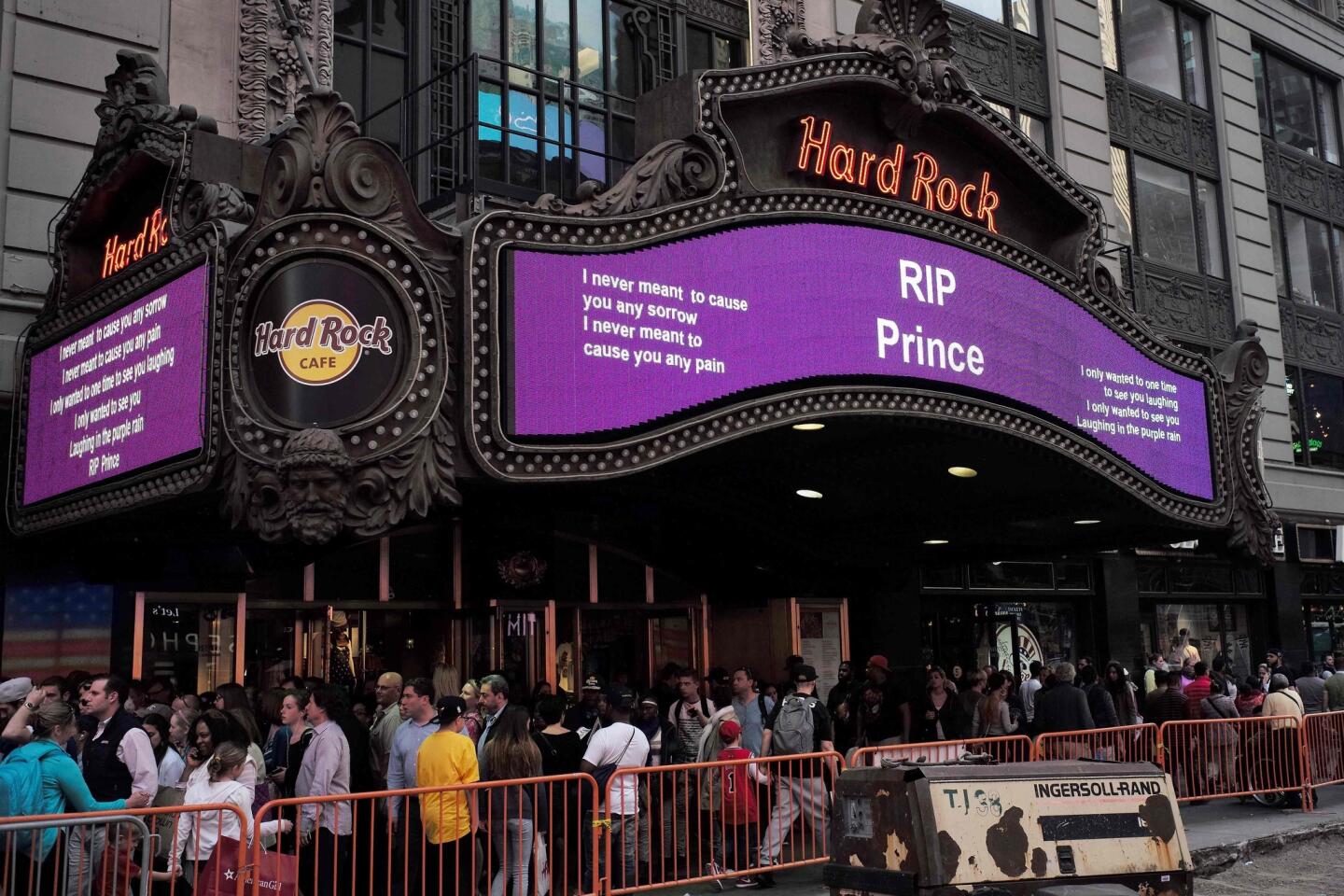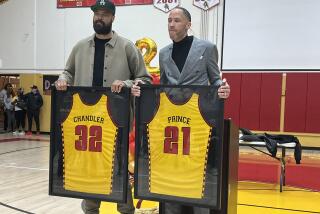In Minneapolis, everyone has a story about Prince
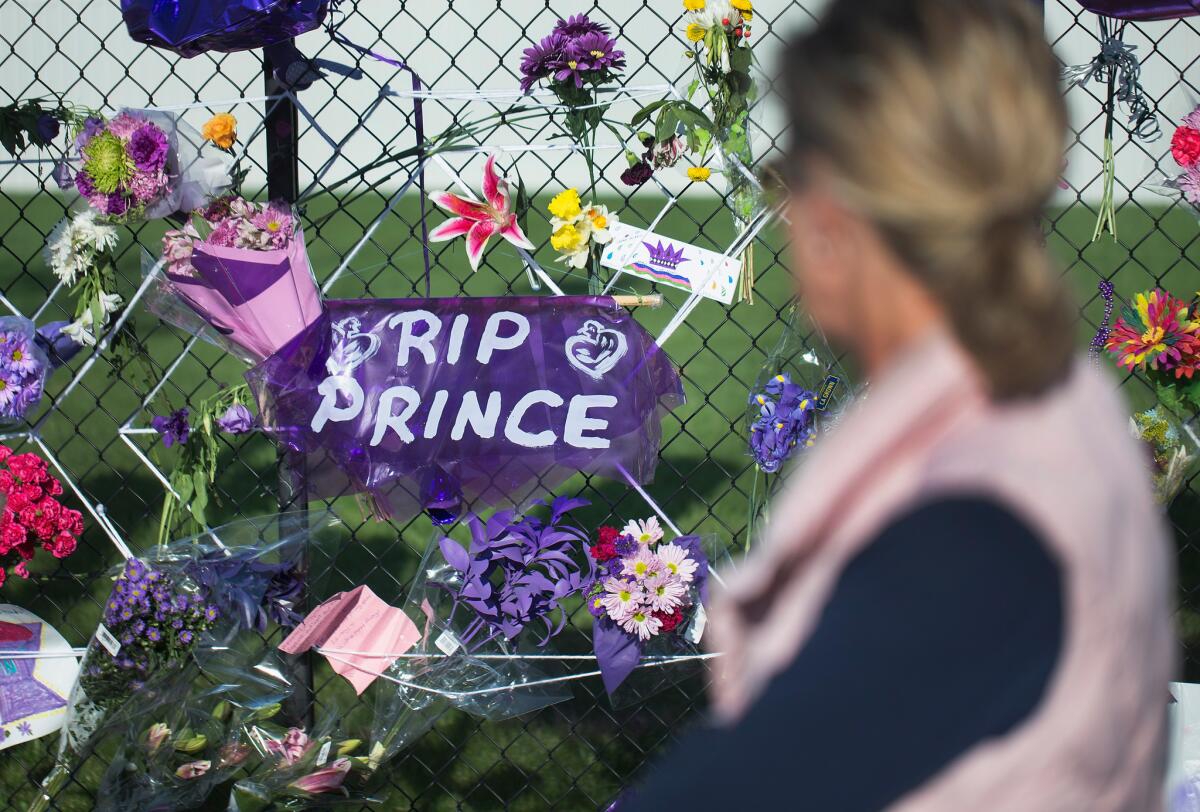
Music fans visit a memorial outside Paisley Park, Prince’s home and studio in Chanhassen, Minn.
Reporting from MINNEAPOLIS — Talk to anyone from the Twin Cities long enough, and you’re likely to discover they have a Prince story.
Perhaps it was the time they played basketball against the 5-foot-2 megastar when he was known as Prince Rogers Nelson, a student at Minneapolis’ Bryant Junior High. Perhaps it was seeing one of his shows at First Avenue, the Minneapolis club where Prince’s legend first grew.
Or perhaps it was catching sight of the gender-bending musical icon visiting a club somewhere downtown, even if just for a moment, and wondering in that split second whether he might suddenly take over the stage — or even the whole room — for one of his legendary parties or impromptu shows. Even if nothing happened, moments like that have stuck with some Minnesotans for decades.
“Dear Prince, I know you can read this,” reads a laminated note attached to the fence surrounding Paisley Park, one of hundreds of tributes that have nearly blocked the view of the geometric white compound where Prince lived, partied and, on Thursday, was found dead of unknown causes at 57.
“I wish I could have met you,” the note continues. “You sang part of a song to me at First Ave in the early 80’s. The song was Beautiful Ones. You knelt down and looked right at me. Everyone around me asked me how that felt. It was amazing. ... If we could have met, we would have been friends. My son reminds me of you because he does his own thing musically, his way. Thanks for teaching people how to be themselves.”
The note is signed, “LUV U, Wendy King.”
Prince’s family had his remains cremated and held a “private, beautiful ceremony to say a loving goodbye,” according to statement from the family on Saturday. The family said a “musical celebration” would be held at a later date.
See the most-read stories this hour >>
In the Twin Cities, Prince wasn’t just a musician. He was a civic symbol. He was dancing, singing evidence to the world that culture didn’t live only in New York, Los Angeles or London, but in Minnesota too. And for that, Minnesotans adored him.
Prince died alone — having collapsed in an elevator in his vast compound in the Minneapolis suburb of Chanhassen, which was empty of the fans, employees, bodyguards and musical fellow travelers who so often filled Minnesota’s space-age version of Graceland.
He was divorced twice, and had no surviving children. At his final party at the estate the weekend before his death, he appeared for only 15 minutes and didn’t play a show, instead slipping back into the solitude he had protected so fiercely through his stardom.
But as soon as word spread that Paisley staffers had found someone dead at the compound Thursday morning, that solitude ended. Concerned onlookers began gathering outside the gates.
When Prince’s death was officially declared at 10:07 a.m. Central time, Minneapolis began to mourn — and then united in a way cities usually do only when there’s a disaster or a national sports championship.
The party hasn’t stopped since.
Less than 12 hours after the announcement of Prince’s death, thousands of fans swarmed to First Avenue, the club where Prince filmed the movie “Purple Rain” and which remained his home base throughout his career. They partied all Thursday night and so deep into Friday morning that some reinforcements arrived to dance a little before starting their morning shifts. The all-night partying is expected to continue through the weekend.
Bridges have been lit purple; the Twins’ baseball stadium has been lit purple; people have been wearing purple clothing and purple jewelry.
“General rule of thumb in Minneapolis tonight: if it can be purple it is purple,” one Twitter user quipped on the night of Prince’s death.
Minnesota Public Radio’s indie station, the Current, began playing Prince nonstop on the air and on a web livestream. And since Prince’s legal battles over intellectual property rights had made his music unavailable almost everywhere else online, the Current suddenly emerged as the center of American music.
------------
FOR THE RECORD
April 23, 2:52 p.m.: An earlier version of this article incorrectly identified Minnesota Public Radio as Minneapolis Public Radio.
------------
“It’s gonna take awhile to sink in,” a DJ for the station said Saturday morning of Prince’s death. At that point, the Current was halfway through a 26-hour “purple reign” marathon of all its Prince tracks, played from A to Z by title, minus a few too racy to skate by FCC rules.
Aficionados of Prince’s sprawling catalog of funk, pop, rock and R&B gravitated to the Electric Fetus, the last place Prince was known to buy any records on Record Store Day, April 16. His reported purchases: six CDs from Stevie Wonder, the Chambers Brothers, Joni Mitchell, Swan Silvertones, Missing Persons and Carlos Santana.
The Twin Cities’ relationship with Prince was an odd combination of hero worship tamped down by the social code of politeness known around these parts as “Minnesota nice.” Fans were thrilled when they spotted him in public, perhaps riding his bike, and yet, knowing how private he was, were often too bashful to approach him.
This local love for Prince — and respect for his privacy and elusiveness — was sometimes expressed as straight-up protectionism, especially at First Avenue.
“There was a saying around the club: If you ever look Prince in the eyes, you’re gonna get fired,” said a former employee, Uluc Ulgen. “It was just something you don’t do.”
Ulgen broke that informal rule once, on May 14, 2010, when Prince arrived at First Avenue in a white limousine, and he was assigned to escort the artist around the club. Ulgen, to his horror, tripped and bumped into Prince — drawing a glare. (He was not fired.)
But more remarkably, Ulgen said, Prince hooked up a guitar and waited offstage to join the local band then playing, the Gayngs. He didn’t just march onstage the way he had marched into the club. He was waiting for someone from the band to invite him on to play. Ulgen thinks the band may have frozen up.
“Can you imagine, you’re playing, and you turn, and Prince is right there?” Ulgen said.
Prince’s guitar was hooked up, and he even played a guitar solo with the band from offstage — but he never was invited on, so after a few minutes, Prince shrugged and left.
“No one knew it was Prince playing that guitar solo,” Ulgen said.
Outside Paisley Park on Saturday afternoon, the crowds continued to grow as everybody from middle-aged moms and dads to young kids in Vikings jerseys came by the hundreds to leave purple balloons or purple flowers on the fence — or just to remember.
Katie Follmer, 59, who moved to Minnesota from Wisconsin in the 1970s, echoed many others at the site when she said, “Prince put us on the map. ... Prince made it OK to live in Minnesota.”
And now she regrets that she never got to see him perform live.
“You always think you got time, and you don’t,” said Follmer, whose favorite Prince song is “Raspberry Beret.”
“It’s one of my biggest regrets. I feel so deeply because he was from Minnesota — he was one of our own.”
As she stood outside Paisley Park’s sprawling array of flowers, paintings, love letters and tributes, she recalled one of Prince’s lyrics: “Life is just a party, and parties weren’t meant to last.”
But to paraphrase another of his songs, when rock ‘n’ roll was alive, it lived in Minneapolis.
Twitter: @mattdpearce
ALSO
Prince practiced door-to-door evangelism
Here are the artists Prince brought into the spotlight
Value of Prince’s $300-million estate is expected to soar in coming years
More to Read
Sign up for Essential California
The most important California stories and recommendations in your inbox every morning.
You may occasionally receive promotional content from the Los Angeles Times.
